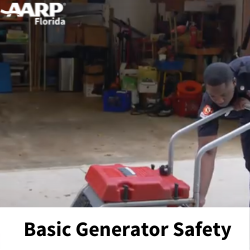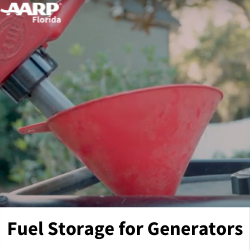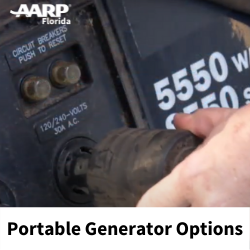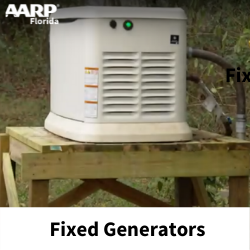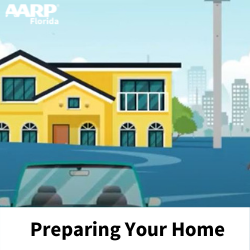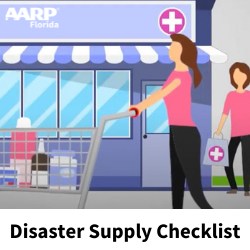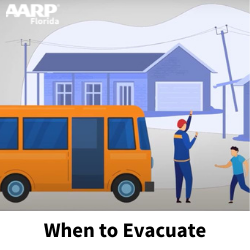AARP Eye Center
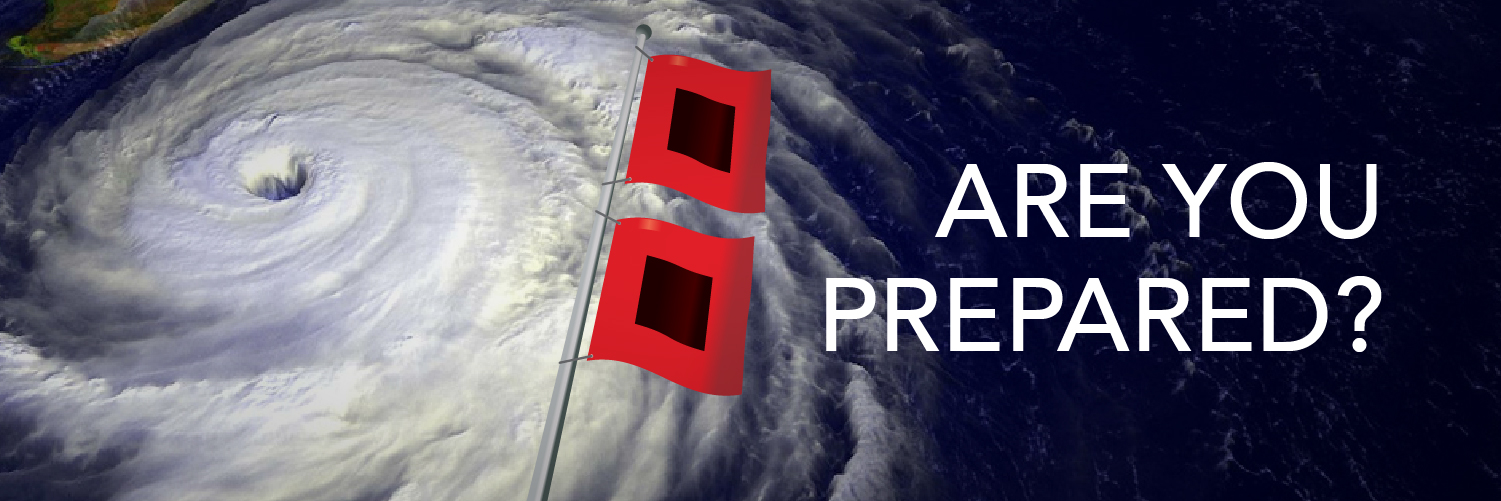
En Español | AARP Florida is here for you. We have resources to help those in need and prepare for the next storm. Below you will find hurricane resources including tips, checklists, video libraries and social media accounts to follow. AARP Florida continuously updates this webpage, and you can check out the AARP Florida Facebook page, where we regularly post updated information.

Get Ready for the Next Storm:
- Storm preparations: It’s long been standard practice for Floridians to prepare two kits as hurricane season begins – a “Stay Kit” so they are prepared if they choose to ride out a storm at home and a “Go Kit” if they need to evacuate in the face of a major storm. Make sure you include health and safety supplies such as alcohol-based sanitizing wipes, several cloth masks, a small bottle of bleach, and nitrile or latex rubber gloves in both kits.
- Know Your Zone, Know Your Home: Every year, it's important for Floridians to know if they live in an evacuation zone, a low-lying, flood-prone area, a mobile home or an unsafe structure during hurricane season. Simply type in your address to find which colored evacuation zones your home is located.
- Evacuation plans: For many years, AARP Florida has encouraged Floridians to prepare by making evacuation plans ahead of a hurricane. Your plan should include several options for hotel accommodations. It’s best to call ahead to ensure that you can find lodging if needed. Be aware of the latest health and safety guidance in your area and prepare accordingly.
- Consider whether you need to use the Florida Special Needs Registry: First responders use the Special Needs Registry as a valuable reference when planning where to place special needs shelters in advance of hurricanes and other emergencies. They also use the registry to check on Floridians in the aftermath of a storm. If you need to register, please visit the Florida Special Needs Registry website, select your county of residence and follow the instructions to register. There is also important information and local resources you may want to review as you register. If your loved one is living with dementia or is otherwise unable to register, you can register for them as their caregiver. Regardless of where you live in Florida, you only need to register once. Register yourself or a loved one now.
- Download Emergency Preparedness Checklist for Adults Age 50+
English | Spanish - Remember to Plan For Fallen Trees. If a falling limb or tree smashes a fence or a deck, your insurance policy may not cover it. You may have to pay for tree removal services out of your own pocket – as well as repairs for the damaged property. Look at your policy now and other tips.
- Storm Surge: Hurricanes’ Biggest Killer is Nothing to Take Lightly. AARP Florida urges any Floridian living near a waterway to plan for storm surge when a hurricane is approaching. Here's how to avoid the surge.
- Generator Safety. Scores of thousands of Floridians now own backup power generators. Many generator purchasers may not yet be familiar with using them. Protect yourself from toxic fumes.
Click on an image below for our suite of generator information and safety videos.
Click on an image below for our suite of animated hurricane preparation informational videos.

Recovery Resources:
For recovery resources, you can visit FloridaDisaster.org, the state division of emergency management’s website, for the latest on the recovery efforts. Or call the State Assistance Information Hotline at 1-800-342-3557. (But if it’s an emergency, call 911.)
Many businesses, including grocery chains, banks, rideshare apps, home improvement stores and wireless telephone companies are offering services and help. Find a list at FloridaDisaster.biz.
Check Florida 511 for updates on traffic and road closures.
Find your American Red Cross location for additional post-storm assistance.
Make sure you check out the AARP Florida Disaster Repair Advice Brochure (printable).
Spanish
Generator, Chainsaw Storage Tips to Ensure Usage After a Storm Hits. Before storing any gasoline-powered equipment, proper maintenance is key. That includes cleaning the equipment inside and out, removing or disconnecting the battery, changing the engine oil and – this is important – adding stabilizer to the fuel. Get all our tips.
Florida's Assignment of Benefits Law Updated to Better Protect Consumers. The rules have changed on how you can get your home repaired after a hurricane or other natural disaster by letting a contractor deal directly with your insurance company. Know your rights when hiring a contractor.
Coping With the Anxieties, Fears, and Stresses of a Hurricane. It’s easy to be overwhelmed with fear, anxiety and dread as the storm goes closer or to witness the devastation after it's gone. Some tips how you can cope.
Government Assistance:
- Apply for FEMA assistance at disasterassistance.gov or through the FEMA app. Or call 1-800-621-3362. Check FEMA’s website to see if you live in an eligible county.
Fuel and Electric Power:
- Find statewide power outage updates at FloridaDisaster.org. You can also track power outages by county at PowerOutage.us.
- Use GasBuddy’s interactive fuel map to find gas stations with fuel and power.
- Learn more about how to safely operate portable generators from AARP Florida.
Insurance:
- If you’re uninsured — or if your insurance doesn’t cover damage related to the hurricane — apply for disaster assistance through FEMA.
- If you have homeowners or renters insurance, FEMA recommends filing a claim with your provider ASAP.
- If you have damage from wind and flood, you’ll need to file two separate claims. For information on how to file a flood claim, visit FEMA’s website or call 877-336-2627.
- Florida’s Division of Consumer Services can also help with insurance questions and claims.
Shelter:
- To locate an open shelter in your county (including shelters for those with disabilities or certain medical needs) go to FloridaDisaster.org.
- Visit Florida has activated an emergency accommodations module on Expedia to help people find hotels and lodging.
- Airbnb has set up a page to help displaced Floridians find accommodations. It’s also working with local nonprofits to offer free temporary housing.
- If you need help finding an affordable rental, use the Florida Housing Finance Corporation’s search tool.
Food and Supplies:
- Find a county-by-county list of centers distributing food, water and ice at FloridaDisaster.org.
- If you’re a SNAP recipient and suffered food losses, you may be eligible for food replacement benefits.
- For information about supermarket and pharmacy closures, visit FloridaDisaster.biz.
Avoiding Scams and Fraud:
- Natural disasters often bring an influx of con artists ready to take advantage of suffering and confusion. Watch out for these three scams.
- Download our checklist to protect yourself from scams and price gouging. English | Spanish
- When dealing with contractors for repairs, flood damage or debris removal, check references, don’t give money up front and ask your insurer if it has any preferred local contractors. Learn more about how to avoid fraud from AARP Florida.
- FEMA keeps a running list of disaster-related rumors and scams and ways to report scammers. If you suspect you’re being scammed, call FEMA’s fraud hotline at 1-866-223-0814.
- It’s illegal to charge grossly inflated prices for essentials like food, gas and supplies during declared emergencies. Report price gouging on the Florida Attorney General’s website, or call 1-866-966-7266.
- Learn more about how to spot a scam from AARP’s Fraud Watch Network.
How You Can Help:
- The Florida Disaster Fund is accepting online donations to support organizations working on recovery. You can also contribute by texting DISASTER to 20222. Or write a check to the Volunteer Florida Foundation, put “Florida Disaster Fund” in the memo line and mail it to 1545 Raymond Diehl Road, Suite 250, Tallahassee, FL 32308.
- AARP Foundation created a relief fund to help support the victims. AARP and AARP Foundation will match donations dollar for dollar, up to a total of $1 million.
- The American Red Cross is seeking donations online to help hurricane victims. You can also sign up to give blood or train as a shelter volunteer.
- Volunteer Florida offers a sign-up sheet for volunteer opportunities.
- The United Way is looking for response, recovery, clean-up and food distribution volunteers.
- Airbnb hosts can sign up to offer emergency stays to displaced Floridians.
- Before you donate or volunteer, FEMA recommends checking the National Voluntary Organizations Active in Disaster website for a list of trusted disaster relief organizations.

Northwest Florida
Facebook:
NOAA National Hurricane Center
National Weather Service - Tallahassee
Twitter:
FEMA Region 4
National Weather Service - Tallahassee
Florida State Emergency Response Team
NOAA National Hurricane Center - Atlantic
National Weather Service
County-by-county list of emergency services:
Florida Division of Emergency Management
Preparedness:
Ready.Gov
Northeast Florida
Facebook:
National Weather Service - Jacksonville
Twitter:
FEMA Region 4
Duval County Emergency Management
Florida State Emergency Response Team
NOAA National Hurricane Center - Atlantic
National Weather Service - Jacksonville
National Weather Service
County-by-county list of emergency services:
Florida Division of Emergency Management
Preparedness:
Ready.Gov
Central/Southwest Florida
Facebook:
National Weather Service – Tampa Bay
National Weather Service – Melbourne
Twitter:
FEMA Region 4 Tampa Bay Red Cross
Florida State Emergency Response Team
National Weather Service – Tampa Bay
National Weather Service – Melbourne
NOAA National Hurricane Center - Atlantic
National Weather Service
Red Cross of Central Florida
County-by-county list of emergency services:
Florida Division of Emergency Management
Preparedness:
Ready.Gov
Southeast Florida
Facebook:
National Weather Service – Miami
National Weather Service – Key West
Twitter:
FEMA Region 4
Florida State Emergency Response Team
National Weather Service – Miami
National Weather Service – Key West
NOAA National Hurricane Center - Atlantic
National Weather Service
Red Cross of SW Florida
Red Cross of South Florida
County-by-county list of emergency services:
Florida Division of Emergency Management
Preparedness:
Ready.Gov
























































